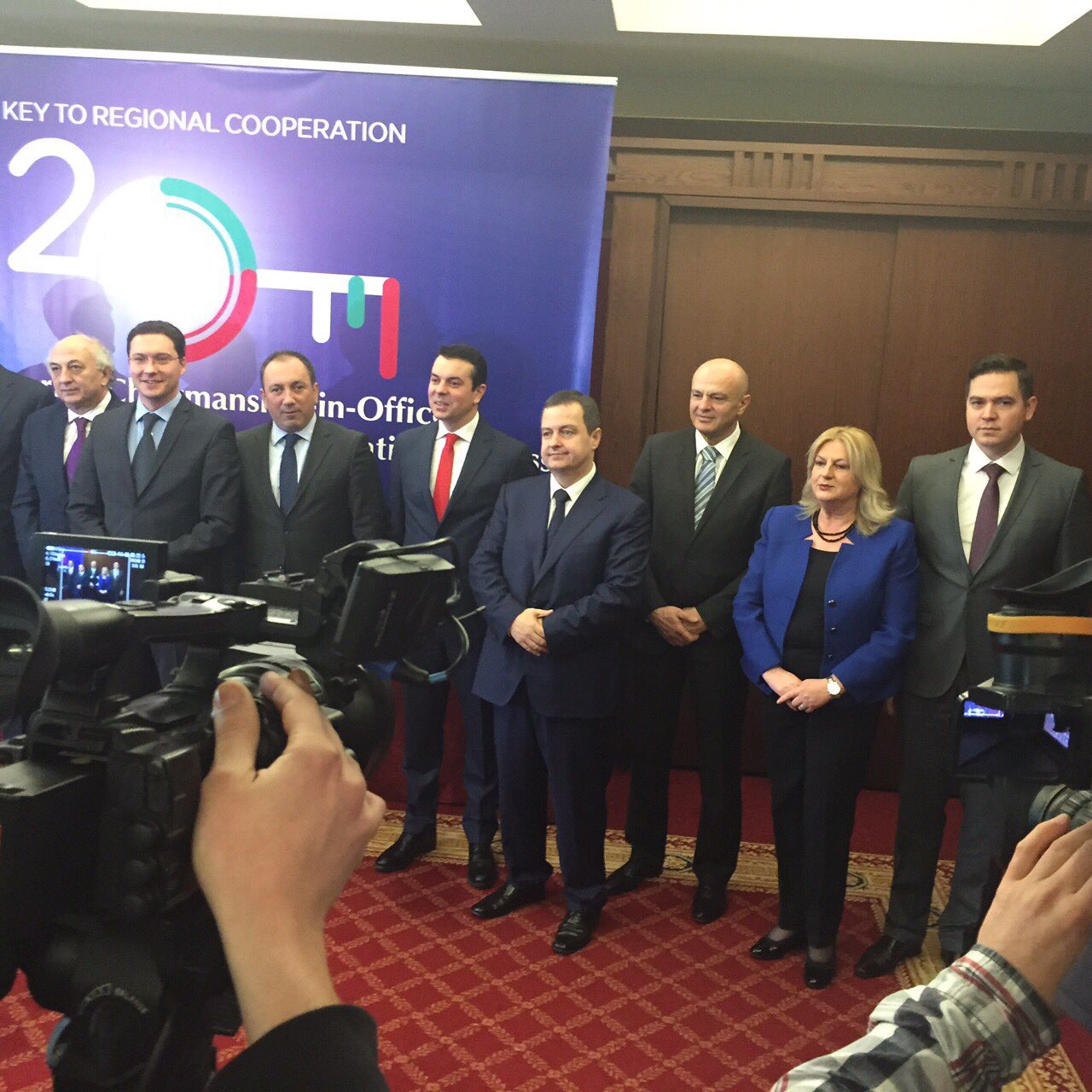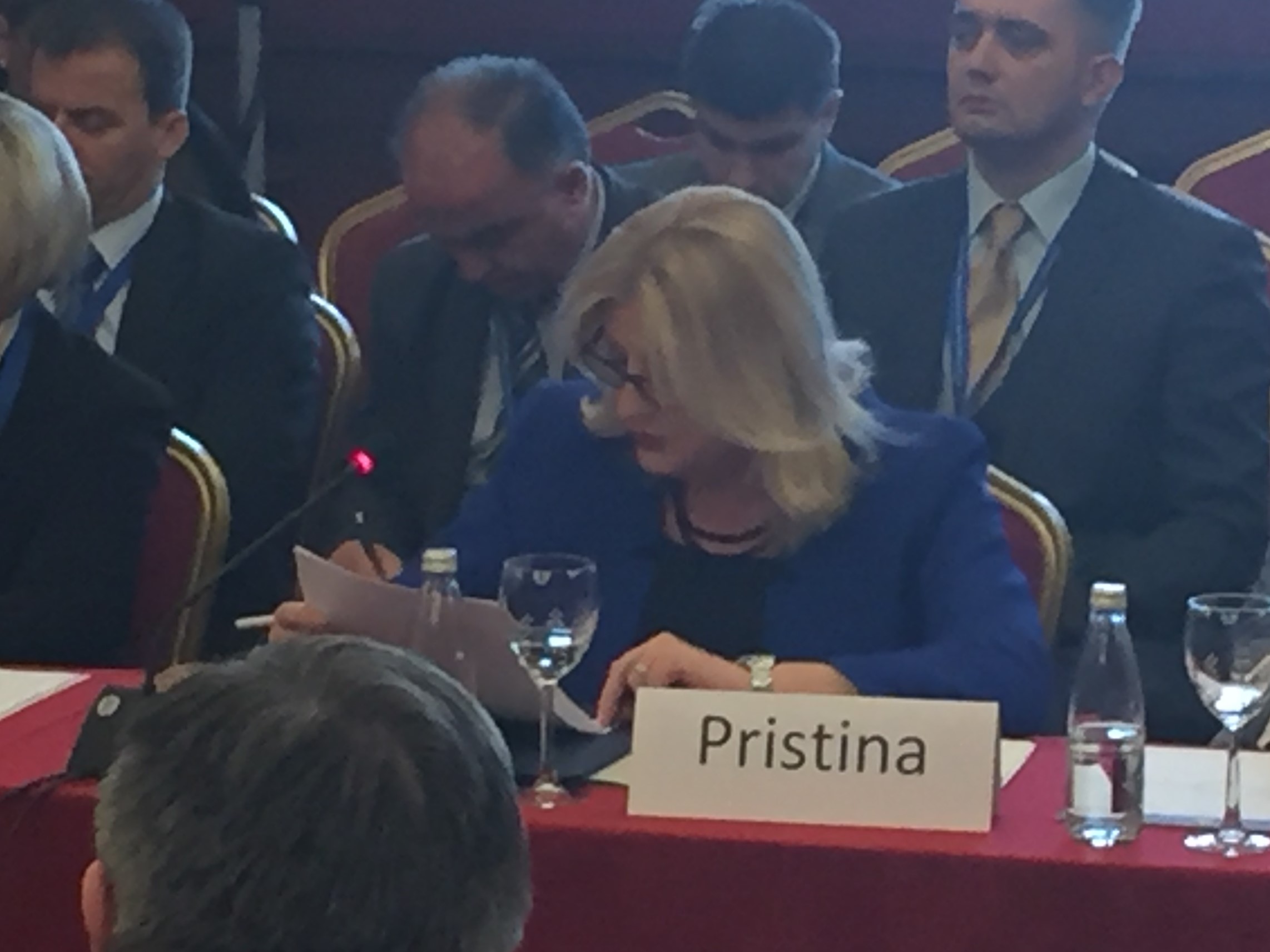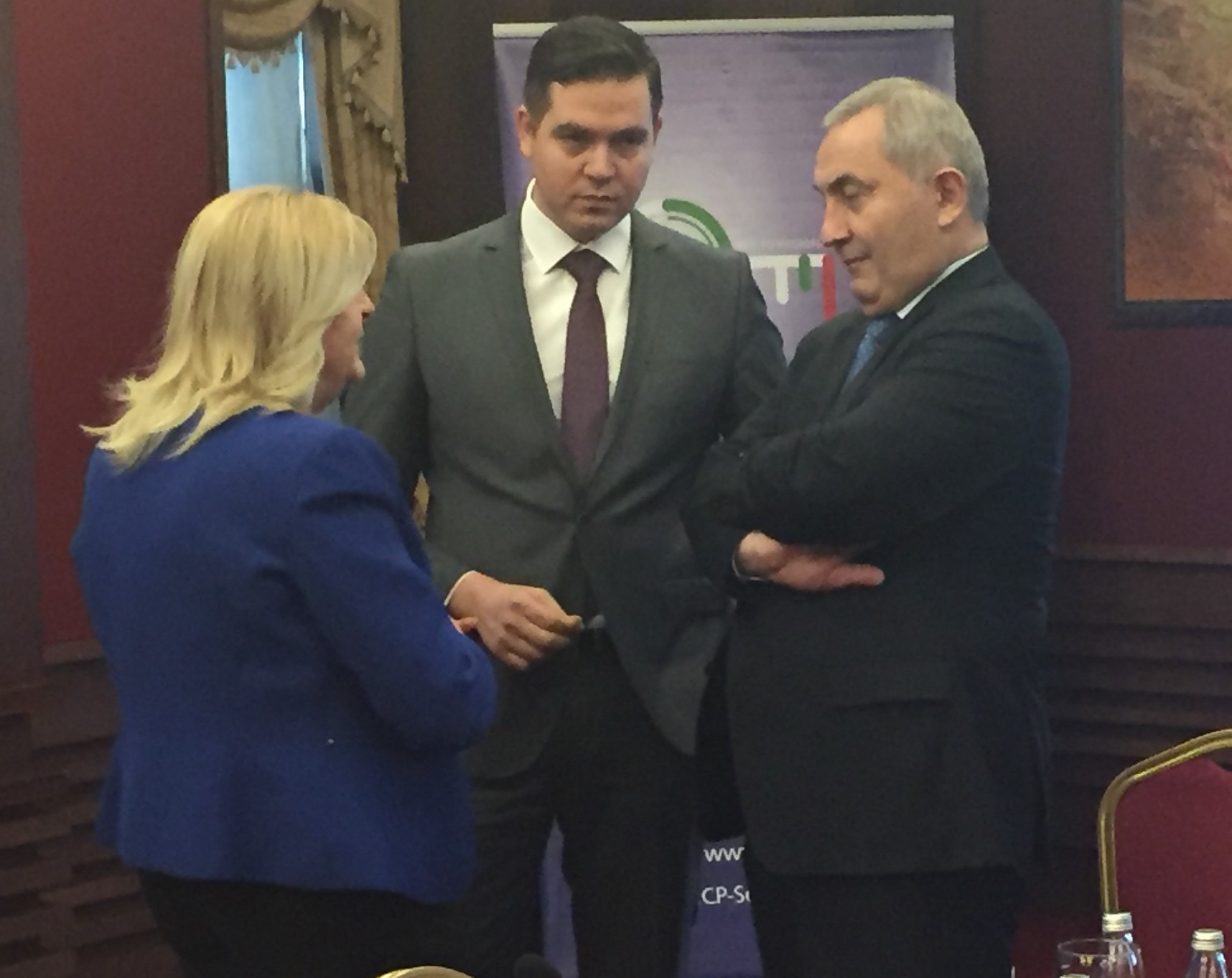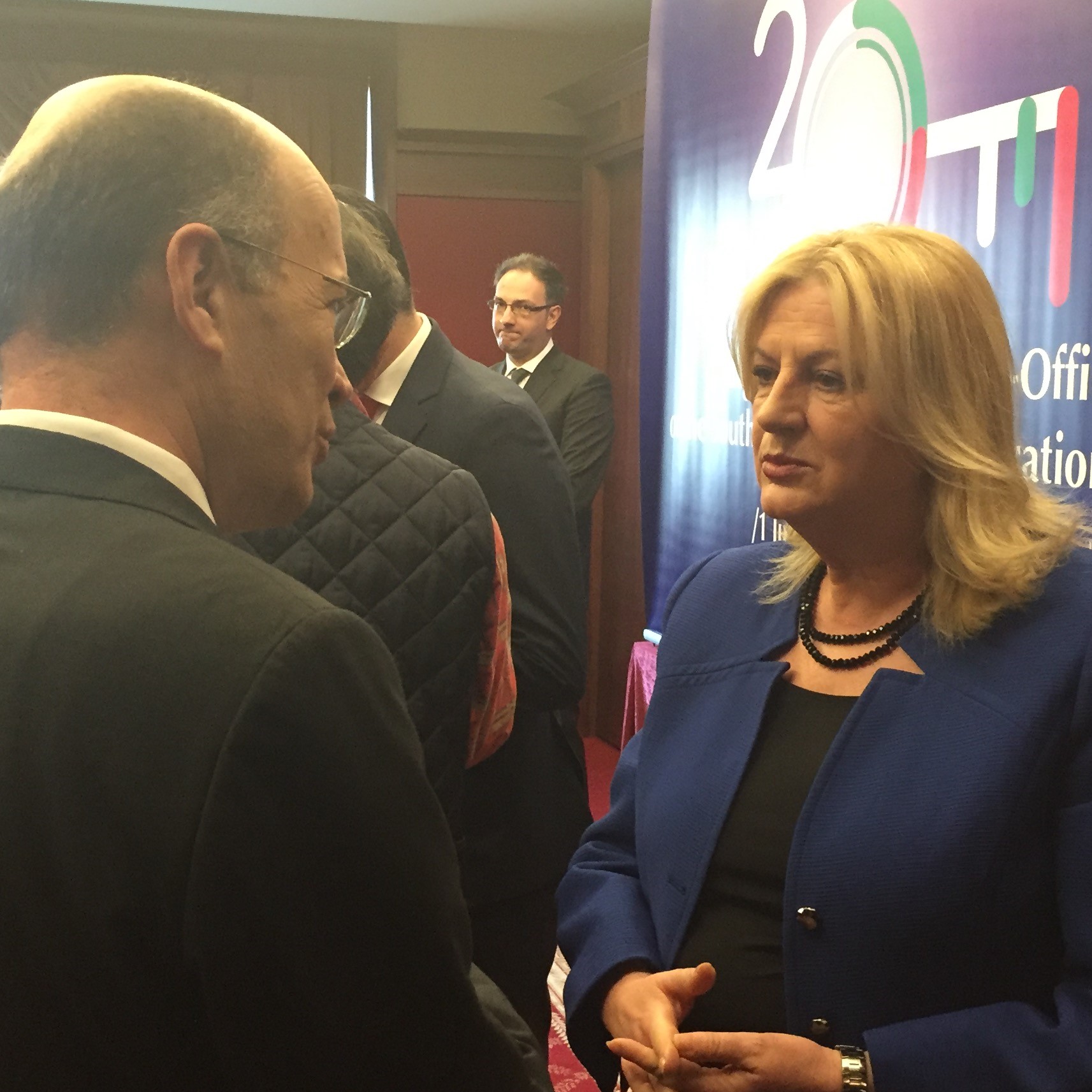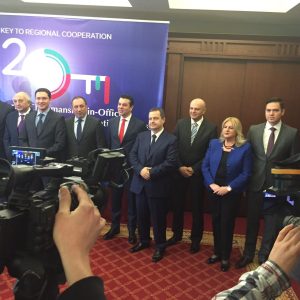Sofia, 2 February 2016
Minister for Dialogue Edita Tahiri, today participated in the Ministerial Summit of the Organization of South East Europe Cooperation Process (SEECP), which was organized by the Ministry of Foreign Affairs of Bulgaria, as rotating leader of this important organization regional, where Kosovo is an equal member with full rights. In this meeting, the main topic was the key challenges in the region of Southeast Europe, in which were present the foreign ministers of the thirteen member countries, and the meeting was chaired by Bulgarian Foreign Minister, Daniel Mitov.
Minister Edita Tahiri addressed the summit with a speech in which inter alia stated that the Republic of Kosovo as the newest member of the SEECP, fully respects the principles and values of SEECP including good neighbourly relations, territorial integrity and regional ownership, because we believe that it provides a sustainable regional cooperation in Southeast Europe.
We believe that the promotion and respect of the values of SEECP guarantees a better future in our South East Europe and Euro-Atlantic future.
She further added that Kosovo believes that good neighbourly relations and regional cooperation re-enforce each other, but however we think that good neighbourly relations should be promoted more and in all areas.
In the spirit of regional cooperation, together with the SEECP activities, Kosovo participates in other initiatives that have further enriched and supplemented participation and regional cooperation.
In line with its external policy, Kosovo promotes good neighbourly relations and this can be seen by our commitment to dialogue for normalization of neighbourly relations with Serbia mediated by the EU, which contributes to strengthening peace and stability in the region.
Kosovo remains focused on European and Euro-Atlantic reforms as foundations to build our democratic state. Reform achievements have brought to Kosovo and its citizens significant positive changes in domestic and international affairs. As a result, Kosovo has signed the Stabilization and Association Agreement with the EU in October last year, officially launched the path towards European Union integration. This not only clarified our Euro-Atlantic future, but also our responsibility to push forward our reform agenda.
Stabilization and Association Agreement signed between Kosovo and the European Union has been a historical moment for Kosovo in its official path towards European integration. This has helped Kosovo to update the motivation to push forward European reforms and continue its responsible in Brussels Dialogue. EU decision on visa liberalization for citizens of Kosovo represents another important step that Kosovo expects with the merit.
In this regard, the rule of law and sustainable economic development are our main priorities in agenda. We are focused on advancing reforms in justice and public administration to ensure competence and integrity of our institutions in the realization of economic development and favourable investment climate.
We are aware of the potential capacities of human and natural resources that exist in the environment, which in return brings dynamic mobility and requires better connectivity in the region.
Speaking about the links and following the steps of the Conference of Western Balkans in Berlin in August 2014 and the ministerial meeting in Belgrade in October 2014, Kosovo has successfully organized meeting of the Foreign Ministers and Ministers of Transport and Infrastructure of the Western Balkans 6. Furthermore, the Vienna Summit in August 2015 within the Western Balkans 6 format, Kosovo, proved the commitment to good neighborly relations and cooperation, signed an agreement concerning the border demarcation with Montenegro.
The only way to face with global challenges and developments affecting our agendas, we think that is achieved through the promotion of cooperation and solidarity in the region.
Ties in the region have multiple meaning in the case of the Western Balkans, bearing in mind the troubled past and tragedies of war. This includes a wide range of issues ranging from diplomatic ties, economic and infrastructure that benefit our region and processes for building peace and reconciliation in general.
While bonds may come as our own internal needs for the development of our countries and the region, we must acknowledge that recent challenges especially security, migration and terrorism call us to stay connected and collaborate. We must demonstrate our responsibility in raising the level of these challenges and to express solidarity and compassion for those who have left their homes to find freedom. Our experience in such disasters is fresh in our minds and hearts.
This forum today should give a clear political message of solidarity and prudent policy meeting in addressing these challenges, and we should remember the European partners which there are an incompatibility between our capacity and complexity of these challenges.
Republic of Kosovo considers regional cooperation as the most important process and essential to bring us closer to the EU and NATO. Through participation in the SEECP, we intend to further strengthen the trust between us and the promotion of Euro-Atlantic integration. Kosovo’s participation contributes to the promotion of democratic potentials within and beyond Kosovo, therefore, I would like to express our appreciation for the outstanding colleagues at this table to support the Republic of Kosovo in various regional organizations.
We remain engaged in pro-active way to achieve inclusiveness in regional cooperation. Kosovo is committed to work together to remove the traditional perceptions of our region. Our joint efforts can transform SEE into a region that generates peace, stability and prosperity. We believe that our region has the potential to stand out as a promotional force of young, dynamic and energy of Europe and become a focal point for infrastructure, transport and energy.
We believe that good economic governance will pave the way for more foreign investment in the region. In fact, better regional cooperation is essential for strengthening our economies, improve our communication and connectivity, and promote further cooperation between elites, civil society, youth and citizens. Our region needs to work closely for the remained resolution of all conflicts; we cannot waste more time.
To overcome regional challenges of today, we also need the support of the EU, a strategic approach that will accelerate the Euro-Atlantic integration for all countries in Southeast Europe. The main focus of this agenda should be policies to ensure mutual recognition between countries of Eastern Europe and willingness to resolve all outstanding bilateral issues, said Minister Tahiri.
In the courses of the summit, Minister Edita Tahiri met with Foreign Minister of Romania, Lazar Comanescu, whom she thanked for the support given to Kosovo’s membership in the SEECP and it happened precisely in the period when Romania was a leader of this organization, in this spirit, the Minister Tahiri asked for more cooperation in the future. Also, Minister Tahiri met the Foreign Minister of Albania Bushati, Foreign Minister of Bosnia and Herzegovina, Igor Crnadak, Deputy Foreign Minister of Turkey, Ali Naci Koru and the Deputy Foreign Minister of Greece, Ioannis Amanatidis and the Deputy Foreign Minister of Moldova, Tudor Ulianovschi.
The delegation of the Republic of Kosovo led by Minister, Edita Tahiri, was composed by Dren Zeka, Kosovo ambassador in Sofia, Shpend Kallaba and MFA Director for the region, Fitim Gllareva.
*********
Kosovo Minister Edita Tahiri’s speech in SEECP Informal Ministerial Summit
Sofia, 2 February 2016
Dear colleagues,
Ladies and Gentlemen,
It is my great pleasure to be here today. I want to congratulate the Bulgarian Chairmanship-in-Office for tremendous efforts in organizing this meeting as well as for all the contribution to the South East Europe Cooperation Process.
We are meeting at a very challenging times for our region. I am confident that this meeting today provides a great opportunity to share our perspectives on latest developments in our region and to reflect on how to overcome challenges ahead of us.
The uniqueness of the SEECP is the political forum it provides and the values it promotes for the better future in South East Europe within the Euro-Atlantic framework.
Republic of Kosovo as a youngest member of SEECP fully adhere to the principles of good-neighbourly relations, territorial integrity and regional ownership, because we believe it ensures a sustainable regional cooperation in Southeast Europe.
Our shared values of meaningful democracy, strengthened rule of law and vibrant economies are making us more responsible and more hard working for the changes we need. The pace of progress of countries in the region marks variations and, we look at it as an opportunity to learn from each other or get lessons learned. Hence, inclusiveness, cooperation and partnership will have a meaningful impact in advancing political, social and economic processes in the region.
Kosovo believes that good neighbourly relations and regional cooperation reinforces each other, yet we think that good neighbourly need to be nourished more and in all fields.
In spirit of regional cooperation, along with activities of SEECP, Kosovo participates in other initiatives that have further enriched and supplemented regional participation and cooperation.
Similarly, in line with its foreign policy, Kosovo promotes good neighbourly relations and this is also exemplified in engaging in the EU facilitated dialogue of normalization of neighbourly relations with Serbia, which contributes to strengthen peace and stability in the region.
Kosovo remains focused in the European and euro-Atlantic reforms as a foundations for a democratic statebuilding of our state. The achievements in reforms has brought to Kosovo and its citizens important positive changes in domestic and international affairs. Kosovo has signed the Stabilization Association Agreement with the EU last October, embarking officially in the journey towards integration in the European Union. This has not only set clarity on our Euro-Atlantic future but also in our responsibility to push forward our agenda of reforms.
The Stabilization Association Agreement signed between Kosovo and the European Union has been a historic moment in Kosovo’s official path to the European integration. It helped Kosovo refresh motivations to push forward European reforms and continue its responsible approach in the Brussels Dialogue. The EU decision on visa liberalization for Kosovo citizens presents another important step forward that Kosovo deservedly anticipates.
In this regard, rule of law and sustainable economic development are ranked high on our agenda. We are focused in advancing reforms in justice and public administration to ensure competence and integrity of our institutions in pursing economic development and friendly climate for investments. Thus, all efforts in this direction need to be addressed properly, including the relevance of regional dimension.
We are aware of human potential capacities and natural resources that exist in our surroundings, which in turn bring us to dynamic mobility and requires better connectivity in the region.
Speaking about connectivity, and following the footsteps of Western Balkans Berlin Conference in August 2014, and ministerial meeting in Belgrade in October 2014, Kosovo has successfully organized the meeting of Foreign Ministers and Ministers of Transport and Infrastructure of the Western Balkan 6. Furthermore at the Vienna Summit in August 2015 within the Western Balkan 6 format Kosovo as a proof of our commitment for good neighbourly relations and regional cooperation signed the agreement concerning the border demarcation with Montenegro.
The only way to cope with difficulties and global developments that affect us all is by promoting cooperation and solidarity in the region.
The connectivity has a manifold meaning in case of the Western Balkans, having in mind the troubled past and tragedies of wars. It encompasses wide range of issues starting from diplomatic, economic, infrastructural connectivity beneficial to our region and peacebuilding and reconciliation processes in general.
While connectivity might come as our internal need to develop our countries and the region, we should admit that latest challenges of security and refugee nature call on us to stay connected and cooperative. We should demonstrate our responsibility to raise to these challenges and show solidarity and compassion to those who have fled homes to find freedom. Our experience in such misfortune is still fresh in our minds and hearts.
This forum today should provide a message of solidarity and compliance with prudent policies in addressing these challenges, while also reminding a discrepancy between our capacities and complexity of these challenges.
Dear Colleagues,
The Republic of Kosovo considers the regional cooperation as the most important and essential process to bring us all closer to EU and NATO. Through our participation in SEECP, we aim to further strengthen the trust between us, and to advance our Euro-Atlantic integration. Kosovo’s participation contributes to promoting democratic potentials within Kosovo and beyond, hence I want to express our appreciation to the distinguished colleagues at this table for supporting Republic of Kosovo in different regional organizations.
We remain proactively engaged to reach a state of comprehensiveness and inclusiveness in regional cooperation. Kosovo is committed to work together to remove the traditional perceptions for our region. Our common efforts can transform the SEE into a region that generates peace, stability and prosperity. We believe that our region has the potential to emerge as a young, dynamic and energetic driving force of Europe and to become a hub for infrastructure, transportation and energy projects.
We believe that good economic governance will pave the way to more foreign investments in region. Indeed, better regional cooperation is essential for strengthening our economies, improving our communication and connectivity, and to promote more the cooperation between elites, civil society, youth and citizens. Our region must work closely on resolving all remaining disputes; we cannot afford to lose more time.
To overcome today’s regional challenges, we will also need the support of the EU, a strategic approach that will speed up the euro-Atlantic integration for all countries in the South-Eastern Europe. At the heart of this agenda should be the policy of ensuring that all countries in SEE recognize each other and resolve all outstanding bilateral issues.
Thank you!
*******************
SEECP JOINT STATEMENT ON MIGRATION CHALLENGES
Sofia, 2 February 2016
We, the Ministers of Foreign Affairs of the South East European Cooperation Process (SEECP) Participants met in Sofia on 2 February 2016, in the presence of the Secretary General of the Regional Cooperation Council and of the representatives of the European Union,
Committed to the principles of good-neighbourly relations, territorial integrity and regional ownership, as the ground for the successful implementation of the regional cooperation in Southeast Europe (SEE),
Rеiterating the importance of SEECP as the main political format for regional cooperation and a factor for security, stability and prosperity in SEE,
Determined to safeguard the essential values of democracy, rule of law and respect for human rights and fundamental freedoms as the basis of economic and social progress,
Considering that the unprecedented mixed migration flows the region is facing have become a major economic, social, humanitarian, political and security concern for the SEECP Participants,
Emphasizing that the best and effective way of dealing with irregular migration is to build meaningful cooperation between the SEECP Participants,
Recalling the resolutions and declarations on migration in the framework of the UN, OSCE, Council of Europe, EU and оther relevant organizations and institutions, as well as the SEECP Joint Statement on Terrorism, adopted in Tirana, 24 February 2015,
Have agreed on the following:
• Express our high interest to alleviate the serious effects that the continuous migratory pressure poses to the border management and security, and to the justice, social, economic and asylum systems;
Recognize the need to act in a spirit of responsibility and solidarity to ensure concerted action, effective coordination and evenhanded management of migration flows in SEE;
• Confirm our determination, with respect for human rights and the rule of law, to maintain a zero tolerance approach to all acts aimed at challenging our common values, security and the established public order;
• Reiterate that only a comprehensive cross-border approach seeking to find long-term solution can be successful, and being aware that coordinated actions may facilitate positive and concrete effects, stress the need for continuous enhanced cooperation at international, European, regional, national and local levels;
• Express our readiness to enhance coordination regarding the movement of migratory flows through relevant information exchange within our region, as well as with relevant EU agencies, international organizations and third countries. In this regard, point out the need on early notification on new measures to be introduced;
• Reaffirm our determination to prevent illegal border crossing and risky journeys, and to fight against organized crime, migrant smuggling and trafficking in human beings, including through an enhanced border management;
• Emphasize the need of improving the dialogue with the countries of origin of irregular migrants. All tools shall be mobilized to enable effective return, in full respect of the principle of non-refoulement, and readmission procedures as one of the main topics of our cooperation with those countries;
• Share the understanding that the focus of the international efforts should be kept on addressing the root causes of migration;
• Recognize that finding political solutions to the existing conflicts generating migration flows towards our region, as well as the defeat of ISIL/Da’esh, are indispensable prerequisites for successful management and mitigation of the migration in SEE;
• Reaffirm our commitment to intensify cooperation in the fight against terrorism and to address the phenomenon of foreign terrorist fighters through the Western Balkan Counter-Terrorism Initiative (WBCTi) and the RCC led Regional Platform for Countering Radicalisation and Violent Extremism;
• Welcome the provision of financial assistance from the EU Regional Trust Fund in Response to the Syrian Crisis, the Madad Fund, as well as the proposal to extend it to the Western Balkans, in order to improve our common response to the migration challenges;
• Pledge full support for the activities of the international community aiming at effectively addressing the challenges of the migration crisis.

